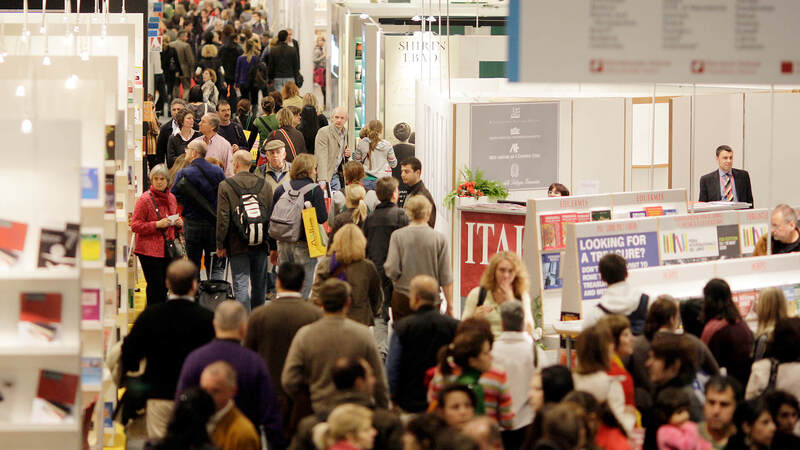You are viewing your 1 free article this month. Login to read more articles.
FBF 2015: Cooking the books
Edouard Cointreau talks about moving the World Cookbook Fair from Paris to Frankfurt.
Edouard Cointreau has taken over the reins of the World Cookbook Fair from his father (also called Edouard). He talks to Tom Tivnan about moving the fair from Paris to Frankfurt, and the top trends in cookbook publishing.
Tom Tivnan: Can you talk about the decision to bring the World Cookbook Fair to Frankfurt and what the strategy was behind that?
Edouard Cointreau: There were many reasons. With the new fair concept [and layout], Frankfurt creates communities and neighbourhoods. The international cookbook market is strong enough to have its own "district", with many publishers exclusively dedicated to food, drinks, nutrition and culinary tourism. At our Paris Cookbook Fair, it was shown that gathering publishers from the culinary sector was an extremely powerful boost for trade. To go further, we wanted to cut down travel and exhibiting expenses for our exhibitors, as many of them needed to be in Frankfurt and Paris. A bigger budget for foreign rights is available when everybody comes to the same major event every year. It includes publishers, authors, chefs, journalists, agents, photographers, stylists and graphic designers. All are together now at the Gourmet Gallery. The "internal" trade of our sector goes on within the whole world of publishing present at the Frankfurt Book Fair.
TT: With a long-term Frankfurt contract, how do you see the World Cookbook Fair progressing over the next few years?
EC: Many bridges are being built in different countries with the tourism industry, which brings funds and new projects to the publishers. We also want to insist on fundraising books and charity initiatives. In parallel, the role of authors is extremely important for the future of the sector: their knowledge, enthusiasm and capacity to promote their work is fundamental for the book market. We need to highlight translators too, as many specific culinary terms and measures are needed to adapt the texts from one language to another.
TT: Can you talk about some of the main trends in the cookery book market over the past year?
EC: Self-financed books are important everywhere. Brands, restaurants, associations, institutions and governments fund a lot of projects. When it comes to the topics, health and nutrition are a priority for many publishers in many countries. It goes
beyond lifestyle: the amount of titles on sustainable agriculture, fisheries management and local productions is stunning. Each region has its own concerns on the present and future of food. As a direct consequence of this, children’s cookbooks are prominent in publishers’ rights catalogues this year. We are also seeing a great deal of interest in wines and spirits, bakery and desserts, and vegetarian recipes. It’s interesting, some months you can have books on the same surprising topics, such
as offal, in very different countries. When the market is saturated (with a subject), it generally comes back some years later. We have noticed it with the swings in the number of meat titles, for example.
TT: Could you single out some territories that have particularly exciting cookery books markets now, and why?
EC: Latin America is surprising everybody in the sector. Some years ago it was difficult to find prestigious titles or consistent production values. Now, all the countries have culinary stars, researchers, historical studies and compendia of regional recipes. [Latin American publishers] have bought a lot of international rights to build their lists up, but their home-grown local lists are now also very dynamic, with a special care with design. We are also thrilled to see Africa in its diversity as a fantastic protagonist of the market’s future. Retaining traditional recipes when the world goes global is seen as extremely important, so the publishers are very active, while the older generations are still there to convey their knowledge.
TT: It seems that some cookery books have obstacles when rights are being sold internationally - a celebrity chef may only be famous in their own country, a particular cuisine may not be popular in another region. What is the key ingredient for a cookery title’s success in the international rights market?
EC: Nearly everybody loves to discover foreign cuisines. It gives a great strength to the market, but the sine qua non remains the adaptability of the book. If the ingredients are impossible to get in your own country, if the layout is incompatible with your standards, or if the text is impenetrable for other cultures, the book can scare the foreign rights buyers. Conversely, when a book explores a new subject, profits can be huge. The surprise can come from a type of cuisine, a precise technique, an original angle, a monograph on an ingredient, etc. In fact, foreign rights work very well in the cookbook market when they fill a void. Curiosity makes the rest.
TT: How do you see digital cookery books developing over the next few years?
EC: Cookbooks have always been very diverse. Are they practical books? Gifts? Encyclopedias? Manuals? The digital era finds them in their multiplicity: some become interactive apps, others are enriched PDFs, others enhanced e-books with videos and step-by-step recipes, and some are a mixture of all this. You can see it in the big reference books, digitised and reorganised as encyclopedias, with a lot of new video content. In general, digital cross- referencing has brought a lot to the market, as you can now jump from one recipe to another through an ingredient or a technique.













